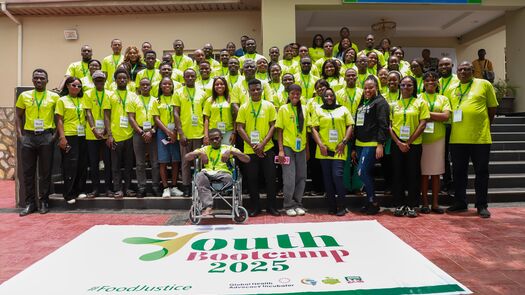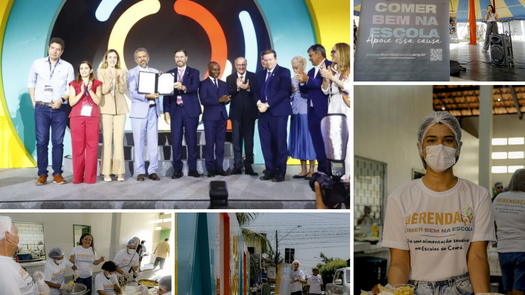November 25, 2025

Veronica Schoj, Vice President, Food and Nutrition Program
On September 18 and 19, I had the honor of representing the Global Health Advocacy Incubator (GHAI) at the 2nd Global Summit of the School Meals Coalition (SMC) in Fortaleza, Brazil. Hosted under the high patronage of the President of Brazil, Luiz Inácio Lula da Silva, the Summit brought together around 80 Coalition member states, over 30 at Minister level and about 60 partner organizations, to take stock of progress and mobilize further action.
The Summit also brought together the World Food Programme, which serves as the secretariat of the School Meals Coalition, other UN Agencies, donors, academics from the Research Consortium and the Sustainable Financing Initiative for School Health and Nutrition, civil society groups, women’s movements, rural and indigenous communities, young people and farmers. All were united by one goal: advancing regenerative school meals [1] that give children healthy meals and support more sustainable food systems. High-level decision-makers from across the globe reported on their countries’ progress and pledged to expand and sustainably finance school meals.
The SMC was created in response to the COVID-19 pandemic, which disrupted education and children’s access to school meals worldwide. Since then, it has grown quickly not only to advocate for the restoration of previous programs, but to make them healthier and accessible to all. Today, it includes 111 governments and 150 partners. In the next five years, the SMC aims to reach 150 million more children by scaling national programs, securing long-term financing and linking school meals to health, education and small-scale sustainable agriculture.
Beyond securing important government commitments, civil society has a critical role in co-creating policies, testing local solutions and proving that school meals can drive equity, resilience and systemic change. In that regard, one key milestone of the Summit was the adoption of the Joint Civil Society Declaration, which GHAI endorsed along with partners. The Declaration highlights that feeding children cannot fall to one sector alone. Communities, farmers, schools and governments must work together. Regenerative school meals, based on agroecological practices and supported by smallholder farmers, can improve children’s nutrition while also protecting the environment.
Civil society’s role was also visible that week through the launch of a new report from our partners FIAN Brasil and School Meals Watch (ÓAÊ): “International cooperation for the right to school meals: a contribution for Brazilian civil society.” The report shows how school feeding advances the human right to adequate food. It offers lessons for Brazil and the global community and reminds us that school meals are not only a service, but a foundation of human rights.
At GHAI, we know that healthy meals are vital but not enough. To truly protect children’s health, governments must also regulate what is sold and advertised in and around schools. Banning ultra-processed foods and sugary drinks, while promoting nutritious alternatives, is essential. A strong approach combines healthy, local food with healthy school environments—helping children grow, learn and thrive.
During the Summit, we also saw how the movement for healthy food environments is gaining momentum locally. The Brazilian state of Ceará approved an important law banning the sale, supply and advertising of ultra-processed foods and sugary drinks in schools, while promoting healthier choices. Backed by six years of advocacy from our partner Instituto de Defesa de Consumidores (IDEC) and championed by local legislators, the law was signed by Governor Elmano de Freitas during the Summit's opening. It will benefit 1.8 million children aged 0 to 14, protecting them from harmful products and advancing their right to real, nourishing meals.
School meals are far more than food on a plate. They are an investment in children’s health and learning. They promote gender and social equity. They strengthen climate resilience and advance human rights. From joint declarations to new laws, the 2nd Global Summit of the School Meals Coalition in Fortaleza showed how collective action is building a healthier, fairer future for children everywhere.
[1] Regenerative school meals refers to the practice of procuring food for school meals from farmers engaged in regenerative agriculture — sometimes referred to as agroecology, organic, sustainable or natural farming, which restores soil health, biodiversity and builds crop and land resilience to extreme weather.



